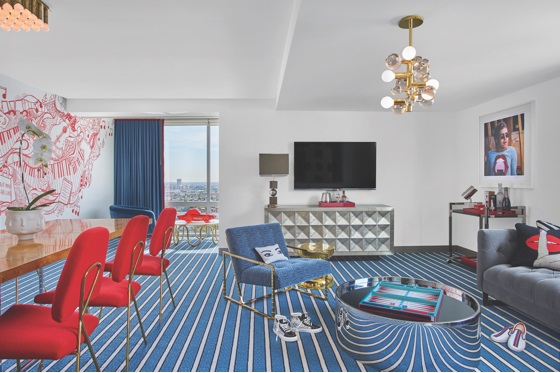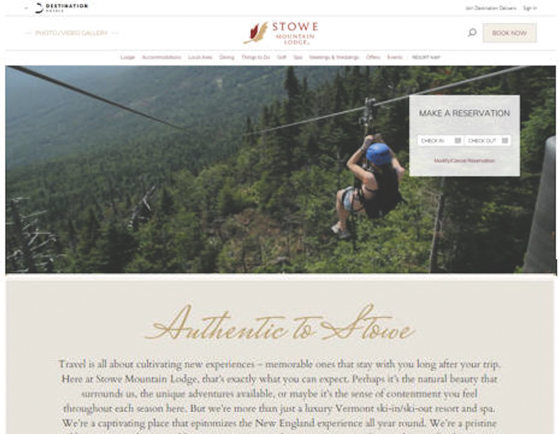It’s all about capturing hearts, minds and eyeballs. Hotels are touting mission and manifesto to attract similarly minded guests, while loyalty programs provide instant gratification and experiences. And established platforms like Instagram and Facebook are evolving to drive guests off of the Internet and into new properties.
As part of HOTELS’ 2017 guide to what’s hot in categories like design, wellness, technology and development, we present what’s new and what’s hot in sales and marketing. What is trending these days? Read on and get inspired – and stay tuned for more.

On a mission
There’s the bottom line, and then there’s the bigger picture. Hotelier Cyril Aouizerate’s newly birthed Mob concept hinges around community. For the Los Angeles-based Andaz West Hollywood, it’s the (RED) Suite, a partnership with the HIV/AIDS advocacy organization (RED), with design by Jonathan Adler. Exactly 30% of each booking for the suite, which ranges from US$519 to US$849 a night, goes directly to (RED), founded by Bobby Shriver and U2’s Bono.
The room, which opened in March and is available to rent for the next three years, pays homage to the hotel’s previous rock ‘n’ roll guests: The Who, Led Zeppelin and The Stones all have paid their partying dues there. Adler tapped into this vibe with ’70s-inspired artwork and metallic touches throughout the glam rock-styled space.
You won’t exactly be partying at the 10-room, members-only La Granja in Ibiza – an experiment from Design Hotels – but you can, you know, communally farm while getting tips from an on-site master farmer.
Set on a centuries-old stone farmhouse, the retreat has signed and labeled garden plots where guests learn about biodynamic agriculture through a series of workshops, classes and community-based projects. In addition to farming, guests can take slow-food workshops, yoga classes, listen to and play music, and hear lectures on topics that deal with issues like the future of mobile societies.
“The core of the entire project is the farm, and the local community that we’ve connected with, so bringing them on board to be part of the project has been instrumental,” said Design Hotels AG CEO and founder Claus Sendlinger.
“I see the need for this type of experiential traveling as a direct reaction to the over-stimulated nature of our modern-day society,” he continued. “More often travelers are seeking transformative travel and to disconnect from their everyday in meaningful ways. For Design Hotels, this meant crafting an experience connected to the land, the crops, and an artistic community to nourish the soul.”
As Jonathan Adler says, it doesn’t just look good, it does good.
By Chloe Riley

In your face
Facebook, with a depth of information on its 2 billion users, is upping its game to compete with metasearch rivals and drive e-commerce.
It recently rolled out City Guides, available in the mobile space, which allows users to connect to hotel websites and book through the Facebook app. It is not yet clear if the social media giant will take a commission for the direct bookings facilitated through the guides.
As well, Facebook’s dynamic ads for travel allow its partners to leverage the platform to drive direct bookings, also in the mobile environment. When someone shows intent for their brand, either on mobile or a desktop, hoteliers can leverage that signal and re-target and cross-sell the potential guest on Facebook with dynamic advertising or dynamic creative against it.
In transitioning from Facebook’s other dynamic ad products to dynamic ads for travel, Facebook reports that IHG, for example, gained a 20% lower cost per booking and a 50% increase in scale.
At the same time, both Facebook Messenger and WhatsApp each have over 1 billion users, giving hoteliers another opportunity to enhance customer service. Messenger recently announced bot-based Smart Replies, which allows a business to answer common customer questions automatically – such as “What time are you open until today?”– so its proprietors can focus on responding to less typical questions.
So, game on. Brand awareness is one thing; booking capability is quite another.
By Jeff Weinstein

Show and tell
“In the past, content was very transactional, and now we’re trying to create more of an experience,” said Isaac Gerstenzang, assistant vice president of corporate e-commerce at Two Roads Hospitality.
Hotel companies are burnishing brand stories with blogs and vlogs that underline their philosophies and reflect the experiences available at their properties. The James West Hollywood-Sunset recently marked its debut by partnering with the David Lynch Foundation, a nonprofit that promotes meditation, on a five-minute movie that coincided with the return of the filmmaker’s “Twin Peaks” to television. Other efforts require a bigger bucket of popcorn: Marriott International’s latest “Two Bellmen” film clocks in at more than 30 minutes.
Video content, easier and faster to stream, is crafted to reflect the experiences available at the destination and the hotel. “From an SEO perspective, we want to make sure that we’re putting great content in there that ties into what the guest wants to search for,” Gerstenzang said. That means making sure that Two Roads’ Stowe Mountain Resort pops up when someone looks for “best places to see leaves change” and responds effectively to voice-activated searches through a user’s smartphone.
Content marketing should be consistent, regardless of the channel, and drive users back to the website – that’s where the booking link is. “At the end of the day, we have to make sure we’re driving ROI,” Gerstenzang said.
By Barbara Bohn

Few points, more experiences
Loyalty programs continue to move away from the tedious process of collecting points and are focusing instead on instant gratification. RLHC discarded its points-based system for a guest recognition program called Hello Rewards. Guests earn a free night after seven stays and get small perks during each stay, such as free breakfast or a US$5 Uber credit. A recent promotion from Best Western Rewards offered guests a US$10 Best Western gift card with every stay.
Hilton Honors hasn’t done away with points entirely, but it has rolled out more initiatives like free Wi-Fi and member-only rates to benefit less frequent travelers. Another major shift in loyalty has been toward offering interesting experiences as rewards, not just free room nights. Earlier this year, Hyatt Hotels & Resorts introduced its new loyalty program, World of Hyatt, which offers a simplified earning structure along with the option to redeem points for extravagant experiences such as a three-day custom itinerary to Japan (done in partnership with Afar Magazine). InterContinental Hotels Group is also focusing on experiences, but ones that guests can partake in during their stay, such as pop-up music concerts at the hotel. “It’s not a one-size-fits-all anymore,” said Liz Crisafi, head of loyalty and partnerships for IHG, about the new frontier for loyalty programs. “It’s not about points, it’s about people.”
By Juliana Shallcross
Insta-satisfaction
It’s a long way from basic selfies and blurry food shots. Earlier this year, the Burj Al Arab Jumeirah dubbed itself Instagram’s most followed hotel after hitting 500,000 followers. The account uses a significant amount of user-generated content, and posts tend toward the bold and high fashion. “People are then almost competing to try and take better photographs,” said Charlie Taylor, Jumeirah Group’s group director of brand communications.
With many fewer followers, Saint-Tropez’s La Résidence de la Pinède ended up being Forbes’ most liked Instagram photo of the year. The shot? A video of the hotel’s private beach off the French Riviera. The hotel uses its own Instagram account to handle guest requests pre- and post-stay.
Boston’s Kimpton Onyx Hotel builds its art collection around social media images from Following Boston, a group of Instagram artists. The hotel has also created “Photo Tip Fridays,” where guests sip wine while listening to Following Boston photographers share advice on generating their own “likes.”
Instagram + wine = we can get behind that.
By Chloe Riley
